Migrant crisis: Greece starts deportations to Turkey
- Published
The BBC's Mark Lowen was in the Turkish town of Dikili as the first boats carrying migrants arrived from Greece
The first boats carrying migrants being deported from Greece have arrived in Turkey as part of an EU plan aimed at easing mass migration to Europe.
Most of the 202 people who left Lesbos and Chios, and arrived at Dikili in western Turkey, are Pakistanis.
Under the deal, for each Syrian migrant returned to Turkey, the EU is due to take in another Syrian who has made a legitimate request.
Thirty-two Syrian migrants were the first to arrive in Germany from Turkey.
They were flown to Hanover in Lower Saxony, officials say.
The Greek authorities say 130 of those returned to Turkey on Monday were from Pakistan. There were 42 migrants from Afghanistan and others from Iran, Sri Lanka and Morocco, as well as several other countries.
Two Syrians were on board, and the Greek authorities insisted that those deported only included migrants who had not sought asylum.
The first returns were carried out calmly, Ewa Moncure, spokeswoman for the EU border agency Frontex, told reporters in Lesbos.
Activists staged small protests there and some shouted "No to deportations" and "EU, shame on you".
There was also a demonstration in Dikili.
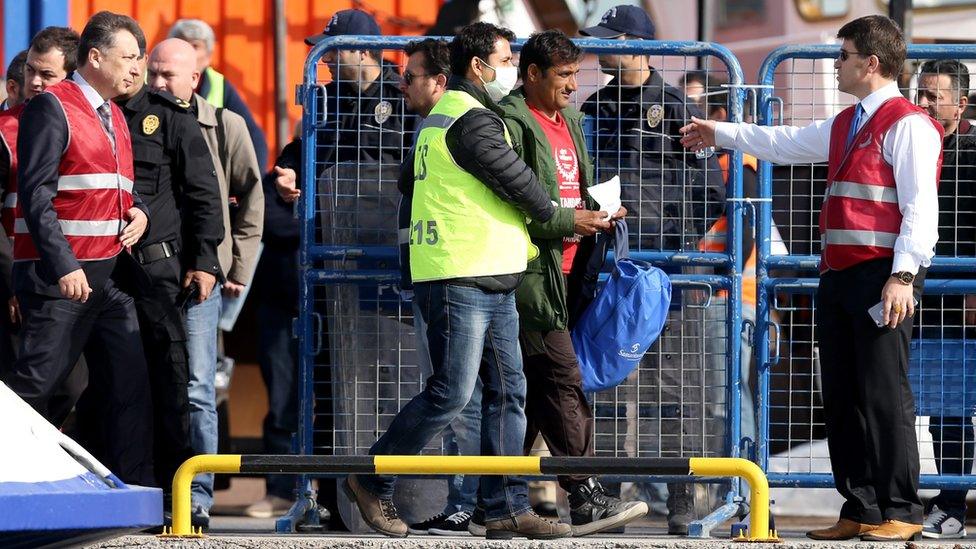
The first group of returned migrants were welcomed by Turkish officials in Dikili
Under the EU-Turkish deal, migrants arriving illegally in Greece are expected to be sent back to Turkey if they do not apply for asylum or if their claim is rejected.
Shortly after the returns started, Greek coast officials rescued two boats near Lesbos with more than 50 migrants, including children and a woman in a wheelchair, Reuters news agency says.
Disputed deal
Migrants in Greece have complained of a lack of information about the asylum procedure and some say they were unaware they could be returned.
Frontex has been calling on EU member states to come forward with additional police officers and other staff to bring its mission in Greece up to strength.

At the scene: Sarah Rainsford, BBC News, Lesbos
The deportations began at first light. Dozens of migrants were bussed to the port, where two small Turkish ferries were moored and waiting.
Riot police were deployed to the quayside and each person being sent back had an individual police escort.
But the migrants, mostly Pakistani men, did not resist. The Greek authorities say none had requested asylum.
Those who have are entitled to individual hearings. The UN refugee agency says more than 2,800 people have already applied: that's almost everyone held at the detention camp here.

In Dikili, demonstrators displayed a banner against the deportations
Mark Lowen, BBC News, Dikili, Turkey
Three boats docked at Dikili port, and were met by local officials and the Turkish Red Crescent.
They were registered in a small tent before being driven away on buses.
Along with other non-Syrians, the returning migrants will be taken to deportation centres where their cases will be assessed.
Turkey has now signed readmission agreements with 14 countries. Syrians refused asylum in Greece will be taken to refugee camps in southern Turkey where, in time, they will take the place of those Syrians directly resettled in the EU under the so-called "one-for-one plan".
Short journey back - BBC correspondents in Turkey and Greece

The arrangement has alarmed rights groups, who say Turkey is not a safe country for migrants.
Amnesty International has accused Turkey of illegally returning Syrians to their homeland, something Turkey denies.
Save the Children called the deal "illegal and inhumane", saying people had told them they would kill themselves if sent back to Turkey.
Migrant arrivals to Greece
154,227
in 2016, up to 20 April
-
376 died on Turkey-Greece route
-
37% of 2016 arrivals are children
-
853,650 arrivals in 2015
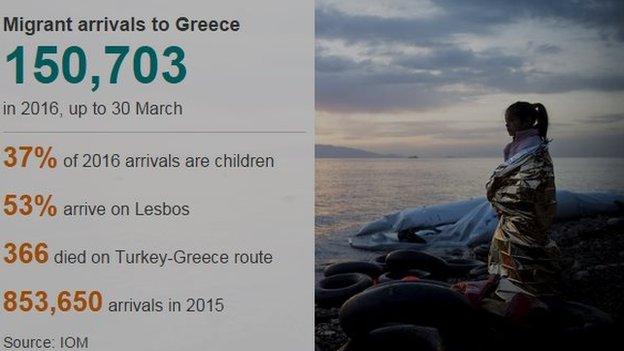
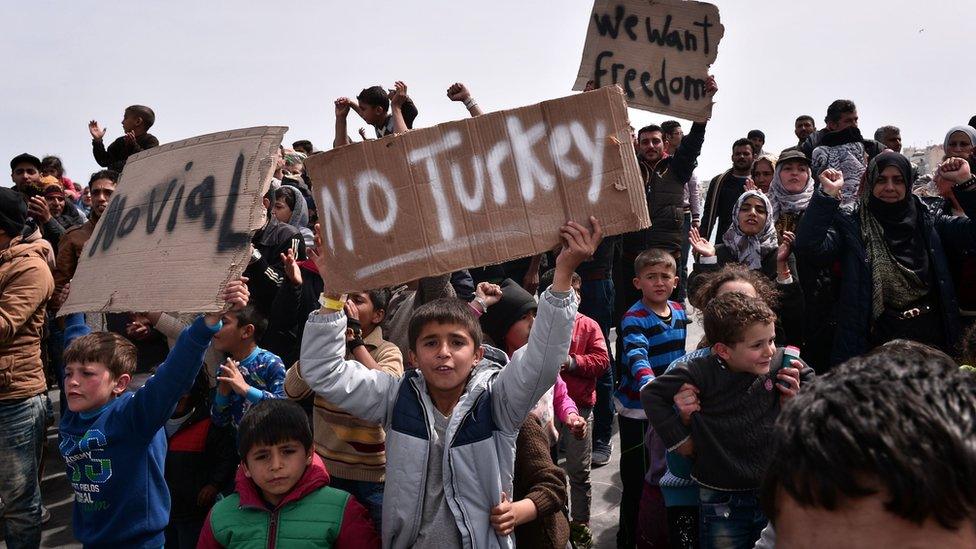
Migrants on the Greek island of Chios have protested against the deal
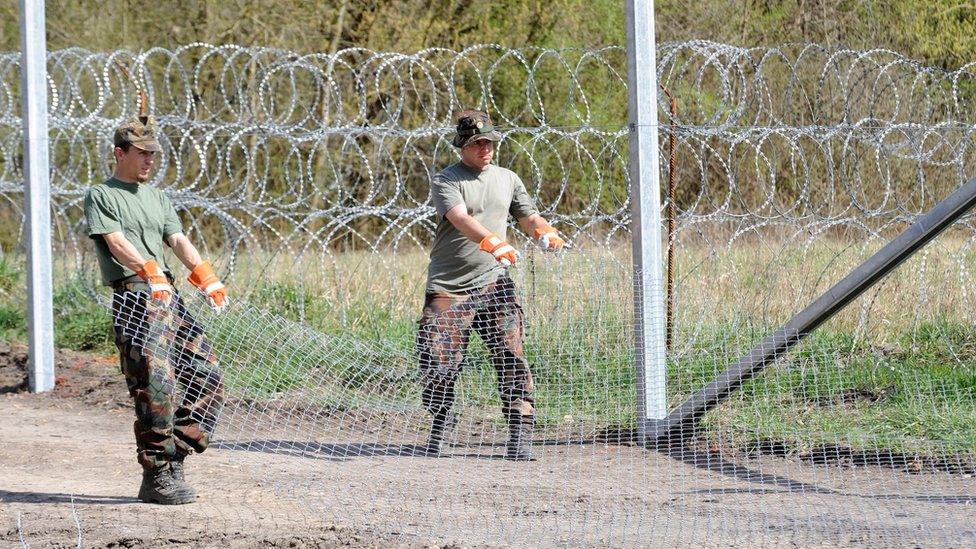
Border controls further north, like here in Hungary, have left thousands stranded in Greece
Since the deal was struck in March, about 400 people have been arriving each day on the Greek islands.
Tens of thousands have been stuck in Greece after northern countries closed their borders. There have been clashes in camps amid dire conditions.
One million migrants and refugees have entered the EU by boat from Turkey to Greece since last year.
Many are keen to travel to Germany and other northern EU countries and experts have warned the deal could force them to take alternative, more dangerous routes.
In Austria meanwhile, pro-migrant protesters clashed with police at a border crossing with Italy.
Austrian Defence Minister Peter Doskozil recently said soldiers would be deployed at a key transit point, saying the EU's outer borders were not properly protected.
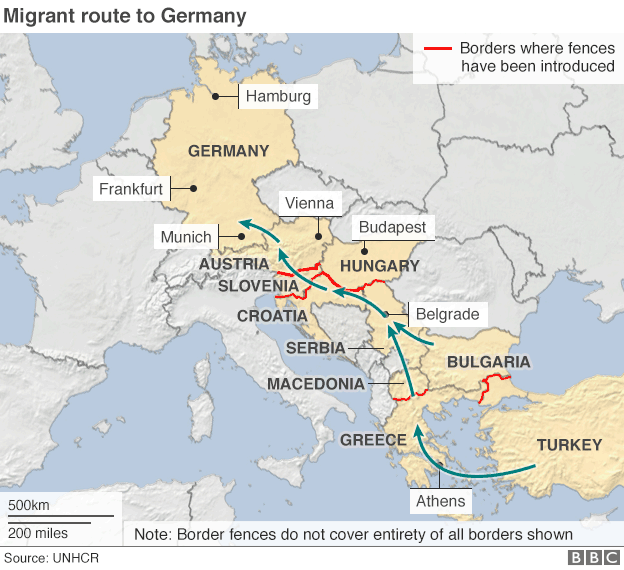

A note on terminology: The BBC uses the term migrant to refer to all people on the move who have yet to complete the legal process of claiming asylum. This group includes people fleeing war-torn countries such as Syria, who are likely to be granted refugee status, as well as people who are seeking jobs and better lives, who governments are likely to rule are economic migrants.